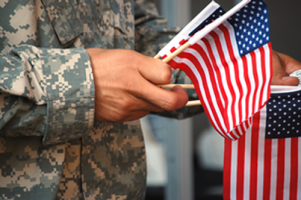Widgetized Section
Go to Admin » Appearance » Widgets » and move Gabfire Widget: Social into that MastheadOverlay zone
Providing Services to Veterans Through Intersector Collaboration
The views expressed are those of the author and do not necessarily reflect the views of ASPA as an organization.
By The Intersector Project
November 18, 2014
 As PA TIMES reflects this month on our nation’s veterans and service members, The Intersector Project takes a look at the cross-sector initiatives around the country that work collaboratively to connect and provide servicemen and women with resources and services. Often we find that issues as complex as veteran care require the collective resources, expertise and networks of the government, business and nonprofit sectors to provide lasting, impactful change.
As PA TIMES reflects this month on our nation’s veterans and service members, The Intersector Project takes a look at the cross-sector initiatives around the country that work collaboratively to connect and provide servicemen and women with resources and services. Often we find that issues as complex as veteran care require the collective resources, expertise and networks of the government, business and nonprofit sectors to provide lasting, impactful change.
Augusta Warror Project
The Augusta Warrior Project (AWP) in the Central Savannah River Area is well-known for its work across sectors and industries to support “warriors” — local veterans and military personnel between tours. Through outreach, advocacy and educational programs, the nonprofit AWP takes a proactive approach to identifying veterans’ needs, coordinating local resources and connecting veterans to organizations and services they need. Under the leadership of President and CEO Jim Lorraine, the project has taken a shared approach, developing partnerships with other nonprofits, local businesses and governmental agencies to improve veteran care in 13 counties in Georgia and South Carolina.
Discussing the organization’s cross-sector model, Lorraine told The Intersector Project, “AWP develops relationships, identifies shared goals with partner organizations and works with stakeholders within the community to develop a comprehensive approach that improves the lives of Warriors and their families.”
AWP works with 4,300 warriors per year, providing tailored support to their needs. In 2013, AWP and its collaborative partners found housing for 72 veterans, assisted 567 in enrollment in higher education and helped 185 find employment. Partners also unveiled in 2013 a new Veterans Center at University of South Carolina at Aiken, providing a centralized area for veteran support. The program is so successful that with financial support from the Wounded Warrior Project, it was scaled up this year to America’s Warrior Partnership, which will work to replicate the Augusta model’s success in other cities around the country.
Read The Intersector Project’s case study on the August Warrior Project, Connecting Veterans to Resources in the Central Savannah River Area.
Texas Veterans Initiative
The new Texas Veterans Initiative announced last week is another example of a cross-sector initiative in veterans affairs. The public private partnership between Meadows Mental Health Policy Institute and the Texas Health and Human Services aims to fill gaps in health services for veterans and their families.
On Veteran’s Day, Texas Governor Rick Perry announced the pilot initiative will bring together state agencies, private donors and local communities to create innovative, collaborative solutions for addressing mental health needs.”Each of the parties involved will share responsibility and accountability in helping improve the lives of Texas veterans who have already given so much to our nation.”
The initiative will utilize more than $1 million in state funding and matching private donations. Projects will be developed by community organizations and funding partners and reviewed by a cross-sector panel of Texas veterans, state and community leaders and mental health experts. If the pilot phase generates widespread interest from communities around the state, the state may expand the program in 2015.
Warrior Gateway
The mission of Warrior Gateway — yet another cross-sector initiative in veterans affairs — is to provide a virtual community center where service members and veterans can connect with one another and with their local community. The initiative provides veterans with “a network of support, allowing members to pose questions to the community, engage with others and make valuable local connections.”
Devin Holmes, Chairman and CEO of Warrior Gateway, is committed to cross-sector approaches to serving veterans and was chosen as an inaugural Presidio Institute Cross-Sector Leadership Fellow. Warrior Gateway focuses on “building innovative technology solutions and strengthening public-private partnerships to ensure veterans and their families have easy access to the resources within the community.” Its work ensures that nonprofit organizations like Warrior Gateway use technology infrastructure to achieve lasting impact in their communities.
All three of these initiatives, as well as the many others operating across the country, illustrate how social sector leaders are increasingly turning to partners in government and business to serve populations in need and tackle critical social issues. In providing for our country’s veterans, these comprehensive, cross-sector collaborations bring together many moving parts, players, and services to provide comprehensive care to those who have served their country.


Follow Us!